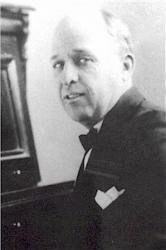Planning worship?
Check out our sister site, ZeteoSearch.org,
for 20+ additional resources related to your search.
- |
User Links
Search Results
Songs of Unsearchable Riches
Publication Date: 1949 Publisher: Boone Publishing Co. Publication Place: Des Moines, Ia. Editors: Edward Boone; Boone Publishing Co.
Songs of Unsearchable Riches
He's coming back again to reign
Author: Edward Boone Appears in 7 hymnals First Line: From Mount Olivet our Savior went to heaven
He's coming back again to reign
The Comforter has come
Author: Francis Bottome Appears in 237 hymnals First Line: O spread the tidings round
The Comforter has come
The cross is not greater than his grace
Author: Ballington Booth Appears in 176 hymnals First Line: The cross that he gave may be heavy
The cross is not greater than his grace
He hideth my soul in the cleft of the rock
Author: Fanny J. Crosby Hymnal: SoUR1949 #d1 (1949) First Line: A wonderful Savior is Jesus my Lord
He hideth my soul in the cleft of the rock
At the cross, at the cross, where I first saw the light
Author: Ralph E. Hudson; Isaac Watts, 1674-1748 Hymnal: SoUR1949 #d2 (1949) First Line: Alas, and did my Savior bleed? And did my Sovereign die?
At the cross, at the cross, where I first saw the light
All hail the power of Jesus' name, Let angels prostrate fall
Author: John Rippon; Edward Perronet Hymnal: SoUR1949 #d3 (1949)
All hail the power of Jesus' name, Let angels prostrate fall
Herbert Buffum

1879 - 1939 Hymnal Number: d42 Author of "He abides, He abides" in Songs of Unsearchable Riches Herbert Buffum was born in La Fayette, Illinois 13 November 1879. He became a member of the Methodist Episcopal Church. He started preaching at seventeen years of age. He did city mission work up and down the Pacific Coast and later in small towns in Kansas. He began publishing hymns at the age of eighteen.
Dianne Shapiro, from "The Singers and Their Songs: sketches of living gospel hymn writers" by Charles Hutchinson Gabriel (Chicago: The Rodeheaver Company, 1916)
Herbert Buffum
Henry J. Zelley
1859 - 1942 Hymnal Number: d51 Author of "He brought me out of the miry clay" in Songs of Unsearchable Riches Henry Jeffreys Zelley was born at Mt. Holly, NJ, on Mar. 15, 1859. Educated in the Mt. Holly public schools, at Pennington Seminary, and at Taylor University, where he earned his M. A., Ph. D., and D. D. degrees, he became a Methodist minister in 1882 and first served in the New Jersey Conference as a statistical secretary, treasurer, and trustee, becoming a promoter of the campmeeting movement.
Noted for his evangelistic fervor, Zelley produced over 1500 poems, hymns, and gospel songs. One of his songs, "He Brought Me Out" with music by Henry L. Gilmour, appears in several denominational hymnals. Cyberhymnal also lists "When Israel Out of Bondage Came" or "He Rolled the Sea Away" with music by Gilmour too. Another of Zelley’s songs, "The Mountains of Faith" with music by M. L. McPhail, is found in Sacred Selections. After working with nineteen different churches in the New Jersey Conference over his lifetime, Zelley, who also served as a trustee of Pennington Seminary, retired in 1929 and died at Trenton, NJ, on Mar. 16, 1942.
--http://homeschoolblogger.com/hymnstudies
Henry J. Zelley
Charles Albert Tindley

1851 - 1933 Hymnal Number: d107 Author of "We'll understand it better by and by" in Songs of Unsearchable Riches Charles Albert Tindley was born in Berlin, Maryland, July 7, 1851; son of Charles and Hester Tindley. His father was a slave, and his mother was free. Hester died when he was very young; he was taken in my his mother’s sister Caroline Miller Robbins in order to keep his freedom. It seems that he was expected to work to help the family. In his Book of Sermons (1932), he speaks of being “hired out” as a young boy, “wherever father could place me.” He married Daisy Henry when he was seventeen. Together they had eight children, some of whom would later assist him with the publication of his hymns.
Tindley was largely self-taught throughout his lifetime. He learned to read mostly on his own. After he and Daisy moved to Philadelphia in 1875, he took correspondence courses toward becoming a Methodist minister. He did this while working as a sexton (building caretaker) for the East Bainbridge Street Church. Beginning in 1885, he was appointed by the local bishop to serve two or three-year terms at a series of churches, until coming full circle to become pastor at East Bainbridge in 1902. Under his leadership, the church grew rapidly. They relocated in 1904 to the East Calvary Methodist Episcopal Church, then again in 1924 to the new Tindley Temple, where the membership roll blossomed to about ten thousand.
Tindley was known for being a captivating preacher, and for also taking an active role in the betterment of the people in his community. His songs were an outgrowth of his preaching ministry, often introduced during his sermons. Tindley was able to draw people of multiple races to his church ministry; likewise, his songs have been adopted and proliferated by white and black churches alike.
The songs of Charles Tindley were published cumulatively in two editions of Soul Echoes (1905, 1909) and six editions of New Songs of Paradise (1916-1941).
His wife Daisy died in 1924, before the completion of the Tindley Temple. He remarried in 1927 to Jenny Cotton. Charles A. Tindley died July 26, 1933.
Charles Albert Tindley


 My Starred Hymns
My Starred Hymns


